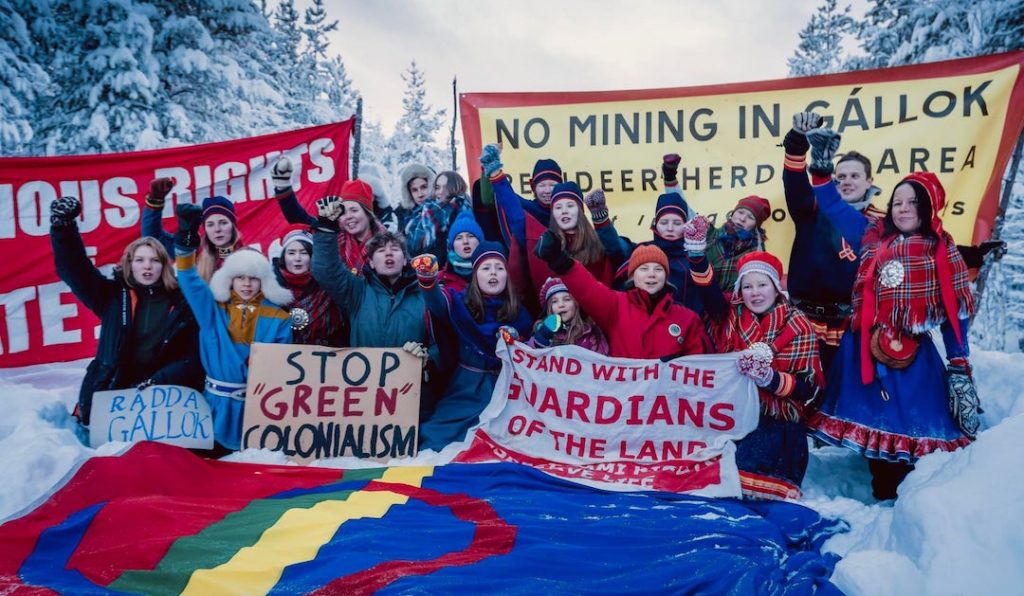Green industry is heading to Scandinavia’s far north. Fossil fuel-free steel and clean, green wind energy are in great demand but what does this rapid development mean for the indigenous people of the region?
In the Arctic town of Jokkmokk, a controversial new iron-ore mine has been given conditional approval in a reindeer herding area.
“When is it enough? We need a debate about the huge issue of consumption. That is indeed the debate we should be having – to reduce the demand for energy and not to increase the supply of energy – whether ‘green’ or whatever.”
.
This time of year our thoughts turn to reindeer and the far north.
Over the last years, the Sami have been struggling to cope with the huge pressures they are facing: Futures Forum: Of reindeer and the Sami way of life and Futures Forum: Of reindeer and the Sami way of life, 2018
One of the biggest pressures is climate change: Climate change in Lapland: Reindeer herders struggle as global warming threatens their future | Euronews
Although the animals can be amazingly adaptive: Rudolph is coping with climate change better than feared—for now
To deal with climate change we need to develop alternatives to fossil fuels: Sweden is a leader in the energy transition, according to latest IEA country review – News – IEA and Sweden’s green revolution in response to climate change – Washington Post
But where should the ‘green energy’ infrastructure be built and where should the resources be found to make it happen?
Sweden’s green power struggle
In Sweden’s far north, indigenous Sami people say their traditional culture and way of life is being threatened by the country’s drive to develop carbon-cutting industries. In the Arctic town of Jokkmokk, a controversial new iron-ore mine has been given conditional approval in a reindeer herding area. Supporters of the project argue it is needed to extract materials to build a new green infrastructure in Sweden, and to create new jobs in an area desperate for regeneration. But the mine is opposed by many Sami
The BBC’s Maddy Savage hears both sides of the debate, and asks if the Sami should be prepared to adapt their often-idealised traditions in the face of climate and economic shifts.
The Documentary – Sweden’s green power struggle – BBC Sounds
The company which wants to develop the mine is British: Kallak mine – Wikipedia and Beowulf Mining – Wikipedia
The new Swedish government has now given permission for the project: Sweden gives qualified go-ahead for northern Kallak iron ore mine | Reuters and Beowulf secures exploitation concession for Swedish iron ore mine
But the protests are increasing: UN advisers urge Sweden to stop mine in home of indigenous Sami | Reuters and Greta Thunberg’s charity funds Sami fight against British mining company | Indigenous peoples | The Guardian

To conclude: the issue is not ‘renewable’ or ‘green’ energy per se – but ‘how it happens’:
Costing the Earth on Radio 4 has also looked at the impact of the ‘green energy revolution’ on northern Sweden:
Green industry is heading to Scandinavia’s far north. Fossil fuel-free steel and clean, green wind energy are in great demand but what does this rapid development mean for the indigenous people of the region?
Costing the Earth – Green Power in the Far North – BBC Sounds
In particular, it was the last word on the programme from Henrick Anderson, a local indigenous reindeer herder, who pointed to what we really need to be talking about:
“When is it enough? We need a debate about the huge issue of consumption.”
And as a commentator says:
“That is indeed the debate we should be having – to reduce the demand for energy and not to increase the supply of energy – whether ‘green’ or whatever.”